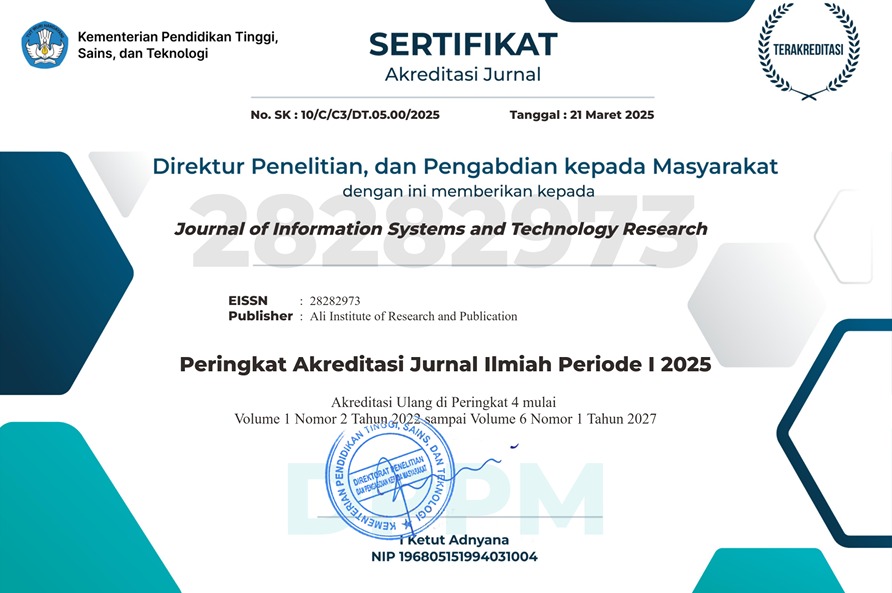Implementation of Tiwana Method in a Knowldedge Management System Prototype
DOI:
https://doi.org/10.55537/jistr.v2i1.606Keywords:
Kano Model, Knowledge Management, Knowledge Gap , Importance & Performance AnalysisAbstract
Improving customer service really needs to be done by a company. one form of service improvement is to provide convenience to customers to submit financing applications that can be done anytime and anywhere. Knowledge management systems (KMSs) are tools aimed at supporting knowledge management. Utilization of Knowledge Management System (KMS) has a positive impact on the continuity of the organization's business, this happens because KMS is an effective way to translate work experience on an ongoing basis in the form of knowledge. The tiwana framework was chosen for the reason that tiwana has advantages compared to other methods for designing KM. The problem faced by cooperatives is that in submitting financing activities it is still manual, namely customers have to come to the Al Salaam sharia cooperative, this is very inconvenient for customers who want to apply for financing and the absence of a container that accommodates all information related to financing products, the type of marketing media used by Al-Saalam is brochures. The purpose of this research is to develop a knowledge management system to improve customer service with the main focus being to provide loan application features. The method used in this study is the Tiwana framework. The results of the research is a prototype of knowledge management system that can be accessed anytime and anywhere by customers.
Downloads
References
E. Adityarini, “Development of Knowledge management system to Support Knowledge Sharing Among Lecturers: Case Study at STMIK Antar Bangsa,” Systematics, vol. 3, no. 3, p. 324, 2021.
S. Anardani, S. Riyanto, D. Setiawan, and P. Korespondensi, “Perancangan Knowledge Management System Berbasis Web Pada Tenaga Kependidkan Fakultas Teknik Universitas Pgri Web-Based Knowledge Management System Design on the Staff of the Faculty of Engineering Pgri Madiun University,” vol. 8, no. 1, pp. 77–84, 2021, doi: 10.25126/jtiik.202183252.
S. Taufik, Ahmad. Aslamiyah, “ANALISA NILAI KESENJANGAN PENGETAHUAN MENGGUNAKAN METODE IMPORTANCE AND PERFORMANCE ANALYSIS PADA MODEL TIWANA,” Jpurnal Inf. Technol. Comput. Sci., vol. 3, no. 2, pp. 260–269, 2020, doi: https://doi.org/10.31539/intecoms.v3i2.1735.
E. Zuraidah, “Knowledge Management System Untuk SDM Menggunakan Seci Model (Studi Kasus: Koperasi Karyawan),” J. Inform., vol. 5, no. 1, pp. 157–168, 2018, doi: 10.31311/ji.v5i1.2481.
Bibit Satriono, A. Profita, and F. D. Sitania, “Perancangan dan Pengukuran Kinerja Perusahaan Berbasis Kerangka Agri-Food Supply Chain,” J. INTECH Tek. Ind. Univ. Serang Raya, vol. 6, no. 2, pp. 123–131, 2020, doi: 10.30656/intech.v6i2.2405.
S. Aslamiyah and A. Agustina, “Pengukuran Kesenjangan Pengetahuan (K-Gap) Menggunakan Importance and Performance Analysis dan Root Cause Analysis,” STRING (Satuan Tulisan Ris. dan Inov. Teknol., vol. 6, no. 1, p. 82, 2021, doi: 10.30998/string.v6i1.9933.
Aulya, “Jenis , Bentuk Dan Penjenjangan Koperasi,” Repos. UIN Makassaar, vol. 4, p. 12, 2022, [Online]. Available: file:///D:/Keperluan TA/landasan teori/MAKALAH JENIS, BENTUK DAN PENJENJANGAN KOPERASI_WINDA AULYA.pdf.
I. Hamidi, A. Bashir, D. P. Atiyatna, S. Sukanto, and M. Mukhlis, “Pelatihan Manajemen Koperasi Syariah di Desa Kerinjing, Kabupaten Ogan Ilir, Sumatera Selatan,” Sricommerce J. Sriwij. Community Serv., vol. 1, no. 1, pp. 9–16, 2020, doi: 10.29259/jscs.v1i1.5.
A. Yuniar, A. H. Talli, and K. Kurniati, “Bisnis Koperasi Syariah di Indonesia,” Al-Azhar J. Islam. Econ., vol. 3, no. 2, pp. 79–88, 2021, doi: 10.37146/ajie.v3i2.103.
M. D. Anggraeni and S. Aslamiyah, “Pengembangan Knowledge Management System dengan Model SECI,” vol. 2, no. 1, pp. 22–32, 2023, [Online]. Available: http://seminar.ilkom.unsri.ac.id/index.php/ars/article/view/874.
F. Choirunsyah, “Perancangan Knowledge Management System Pada Tenaga Kependidikan Di Perguruan Tinggi,” Infomatek, vol. 21, no. 1, pp. 01–14, 2019, doi: 10.23969/infomatek.v21i1.1609.
R. Novita, “Pengembangan Kompetensi Profesional Dosen Berbasis Knowledge Management System,” Semin. Nas. Teknol. Inf. Komun. dan Ind., no. November, pp. 129–136, 2018.
A. Syarifudin, “Perancangan Sistem Informasi Pengajuan dan Pelaporan Pembayaran Tunjangan Kinerja Kementerian Keuangan Menggunakan Metode Prototype,” J. Sisfokom (Sistem Inf. dan Komputer), vol. 8, no. 2, pp. 149–158, 2019, doi: 10.32736/sisfokom.v8i2.641.
Y. H. Adnyana, I Ketut Widhi Wirawan, “Teknik Perancangan Arsitektur Knowledge Management System (KMS),” Maj. Ilm. Unikom, vol. 17, no. 2, pp. 103–110, 2020.
S. Aslamiyah, S. Anisah, E. Yulianto, and K. Widyantoro, “The Knowledge Management System ( KMS ) to Reduce Knowledge Gap at STMIK Widuri Student Unit,” 2019. [Online]. Available: https://search.proquest.com/openview/b7d16f1fca016222c6b111d310c247fb/1?pq-origsite=gscholar&cbl=2028729%0Ahttp://www.ijascse.org/ijascse-volume-8-theme-based-issue-9.
Additional Files
Published
How to Cite
Issue
Section
License
Copyright (c) 2023 Siti Anisah

This work is licensed under a Creative Commons Attribution-ShareAlike 4.0 International License.







